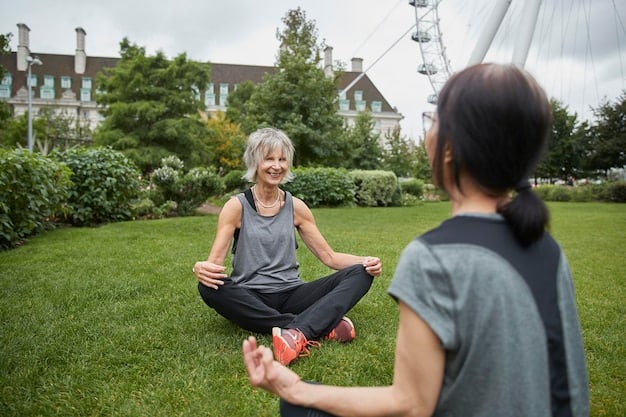Emotional Resilience for Caregivers: Self-Care Tips to Prevent Burnout in 2025

Emotional resilience for caregivers involves implementing specific self-care strategies to mitigate burnout, encompassing mindfulness, setting boundaries, seeking support, prioritizing physical health, engaging in enjoyable activities, practicing gratitude, and fostering self-compassion, all tailored for the unique challenges faced by caregivers in 2025.
Caring for others is rewarding, but it can also be incredibly demanding. The stress and emotional toll can lead to caregiver burnout. That’s why cultivating emotional resilience for caregivers: 7 self-care tips to prevent burnout, updated for 2025 , is more important than ever.
Understanding Emotional Resilience for Caregivers
Emotional resilience is the ability to bounce back from stress and adversity. For caregivers, who often face chronic stress, developing this resilience is not a luxury but a necessity. It’s about maintaining emotional well-being amidst the demands of caregiving.
Without emotional resilience, caregivers are at a higher risk of burnout, depression, and other health problems. Building resilience involves adopting coping mechanisms and self-care practices that protect your mental and emotional health.

The Impact of Caregiving Stress
Caregiving responsibilities can lead to chronic stress, which negatively affects both physical and mental health. Understanding the specific stressors associated with caregiving is the first step toward building emotional resilience.
- Emotional Strain: Constantly dealing with the emotional needs of the person you’re caring for can be draining.
- Physical Demands: Many caregivers face physically demanding tasks, resulting in fatigue and potential injuries.
- Social Isolation: Caregiving can limit social interactions, leading to feelings of loneliness and isolation.
- Financial Concerns: The costs associated with caregiving can create financial stress, compounding emotional challenges.
Building emotional resilience will allow caregivers to face daily challenges and mitigate the impact of stress.
Tip 1: Practice Mindfulness and Meditation
Mindfulness and meditation are powerful tools for cultivating emotional resilience. These practices help you stay present, reduce stress, and improve your overall well-being. By incorporating mindfulness into your daily routine, you can better manage emotions and prevent burnout.
Mindfulness involves paying attention to the present moment without judgment. Meditation, a specific mindfulness technique, involves focusing your mind to achieve a state of calm and relaxation.
How to Incorporate Mindfulness
You don’t need to dedicate hours to mindfulness; even a few minutes each day can make a difference. Here are a few ways to begin:
- Mindful Breathing: Take a few moments each day to focus on your breath. Inhale deeply and exhale slowly, paying attention to the sensation of the air entering and leaving your body.
- Body Scan Meditation: Lie down or sit comfortably and bring your attention to different parts of your body, noticing any sensations without judgment.
- Walking Meditation: Pay attention to the sensation of your feet making contact with the ground as you walk. Focus on the movement and the rhythm of your steps.
Regular mindfulness practice can significantly reduce stress and improve your emotional resilience.
Tip 2: Set Boundaries and Learn to Say No
Caregivers often struggle with setting boundaries, feeling obligated to meet every need of the person they’re caring for. However, setting boundaries is essential for protecting your time, energy, and emotional well-being. Here’s how to set and maintain healthy boundaries:
Setting boundaries ensures that you have adequate time for rest and personal activities. It also prevents you from becoming overwhelmed and resentful.
Effective Boundary Setting
Setting boundaries involves communicating your limits clearly and assertively. It’s about recognizing your needs and prioritizing your own well-being.
- Identify Your Limits: Determine what you can realistically handle without compromising your health and well-being.
- Communicate Clearly: Let others know your boundaries in a direct and respectful manner.
- Be Assertive: Stand your ground when others try to push your boundaries. It’s okay to say no without feeling guilty.
Remember, setting boundaries is not selfish; it’s a necessary part of self-care.
Tip 3: Build a Strong Support System
Caregiving can be isolating, so building a strong support system is crucial for emotional resilience. Connecting with others who understand your situation can provide emotional support, practical advice, and a sense of community. This can prevent feelings of isolation and help you maintain a positive outlook.
A strong support system can provide respite care, emotional support, and practical assistance. It’s about building a network of people you can rely on during challenging times.

How to Build Your Support System
Building your support system through regular communication helps keep things in perspective and brings new ideas.
- Join a Support Group: Look for local or online support groups for caregivers. Sharing your experiences with others who understand can be incredibly validating.
- Seek Counseling or Therapy: A therapist can provide individualized support, helping you develop coping mechanisms and manage your emotions.
- Ask for Help: Don’t be afraid to ask friends and family for assistance. Many people are willing to help but don’t know what you need unless you ask.
Having a reliable support system helps you to feel less alone and manage your responsibilities with greater ease.
Tip 4: Prioritize Physical Health
Physical health and emotional well-being are interconnected. When you take care of your body, you also enhance your emotional resilience. It’s easy to let personal health slide when you’re focused on someone else’s needs. Ensuring regular exercise, a healthy diet, and sufficient sleep improves physical well-being and bolsters your capacity to cope with emotional challenges.
This means making time for regular exercise, eating a balanced diet, and getting enough sleep. Neglecting your physical health can lead to increased stress and reduced emotional resilience.
Strategies for Prioritizing Physical Health
Taking care of your physical health is crucial for maintaining emotional resilience. Here are some practical strategies you can implement:
- Regular Exercise: Aim for at least 30 minutes of moderate exercise most days of the week. Exercise reduces stress hormones and boosts mood.
- Balanced Diet: Eat a diet rich in fruits, vegetables, whole grains, and lean protein. Avoid processed foods, sugary drinks, and excessive caffeine.
- Sufficient Sleep: Aim for 7-8 hours of sleep per night. Create a relaxing bedtime routine to improve the quality of your sleep.
Prioritizing physical health enhances your emotional well-being, enabling you to manage caregiving responsibilities more effectively.
Tip 5: Engage in Enjoyable Activities
Engaging in activities that bring you joy can provide a much-needed break from the demands of caregiving. Hobbies, social activities, or simply spending time in nature can help you recharge and maintain a positive outlook. These activities also prevent burnout by providing opportunities for relaxation and enjoyment.
It’s important to carve out time for these activities, even if it’s just for a few minutes each day. Engaging in hobbies and social activities can significantly reduce stress and improve your emotional resilience.
Incorporating Enjoyable Activities
Make time for activities that bring you joy and help you recharge. Here are some suggestions:
- Hobbies: Pursue hobbies that you enjoy, such as reading, gardening, painting, or playing a musical instrument.
- Social Activities: Spend time with friends and family. Social interactions provide emotional support and help you feel connected.
- Nature: Spend time outdoors, whether it’s taking a walk in a park, hiking in the woods, or simply sitting in your garden.
Taking time for enjoyable activities helps you to maintain a positive attitude and prevent burnout.
Tip 6: Practice Gratitude
Practicing gratitude—taking a moment to notice and appreciate the good things in your life—can significantly enhance emotional resilience. Focusing on positive aspects can shift your mindset, reducing feelings of stress and negativity. This simple practice helps you maintain a balanced perspective and fosters a sense of contentment.
Gratitude involves acknowledging and appreciating the positive aspects of your life, no matter how small they may seem. Regular gratitude practice can shift your focus from what you lack to what you have.
How to Cultivate Gratitude
Cultivating gratitude helps you to appreciate the positive aspects of your life. Here are some ways to incorporate gratitude into your daily routine:
- Gratitude Journal: Keep a journal and write down a few things you’re grateful for each day.
- Gratitude Meditation: Take a few minutes each day to focus on the things you’re grateful for.
- Express Gratitude: Express your appreciation to others. Thank people who have helped you or done something kind for you.
Regular gratitude practice can foster a sense of contentment and improve your emotional resilience.
Tip 7: Foster Self-Compassion
Caregivers are often very critical of themselves, focusing on their perceived shortcomings rather than acknowledging their efforts. Self-compassion involves treating yourself with the same kindness and understanding you would offer to a friend facing similar challenges.
Self-compassion involves treating yourself with kindness, understanding, and acceptance. It’s about recognizing that you’re not perfect and that everyone makes mistakes.
Practicing Self-Compassion
Practicing self-compassion involves treating yourself with the same care and understanding you would offer to a friend. Here are some ways to cultivate self-compassion:
- Self-Kindness: Treat yourself with kindness and gentleness, especially when you’re struggling.
- Common Humanity: Recognize that you’re not alone in your struggles. Everyone experiences challenges and setbacks.
- Mindfulness: Practice mindfulness to become aware of your thoughts and emotions without judgment.
Fostering self-compassion enhances your emotional resilience, helping you navigate the challenges of caregiving with greater ease.
| Key Point | Brief Description |
|---|---|
| 🧘 Mindfulness & Meditation | Practicing mindfulness can reduce stress and improve overall well-being. |
| 🚫 Setting health Boundaries | Setting boundaries protects time and energy, preventing overwhelm and resentment. |
| 🤝 Building Support | Connecting with others provides emotional support and practical advice. |
| 💖 Self-Compassion | Treating yourself with kindness and understanding can enhance emotional resilience. |
Frequently Asked Questions (FAQs)
▼
Emotional resilience is the ability to bounce back from stress and adversity. It’s important for caregivers because they often face chronic stress and need effective coping mechanisms to prevent burnout.
▼
Mindfulness and meditation promote relaxation, reduce stress, and improve emotional regulation. They help caregivers stay present and manage their emotions during challenging times.
▼
Setting boundaries protects caregivers’ time and energy, preventing them from becoming overwhelmed and resentful. It ensures they have adequate time for rest and personal activities.
▼
Prioritizing physical health through exercise, a balanced diet, and sufficient sleep enhances emotional well-being. It boosts mood and reduces stress hormones, making it easier to cope with challenges.
▼
Self-compassion involves treating yourself with kindness and understanding, especially during difficult times. It helps caregivers avoid self-criticism and fosters a more supportive inner dialogue.
Conclusion
Building emotional resilience for caregivers: 7 self-care tips to prevent burnout, updated for 2025 by prioritizing self-care is paramount. Engaging in mindfulness, setting and maintaining boundaries, building a support network, focusing on physical health, taking part in leisure activities, practicing appreciation, and cultivating self-compassion can equip caregivers to manage stress, prevent burnout, and provide the best possible care with optimism.





